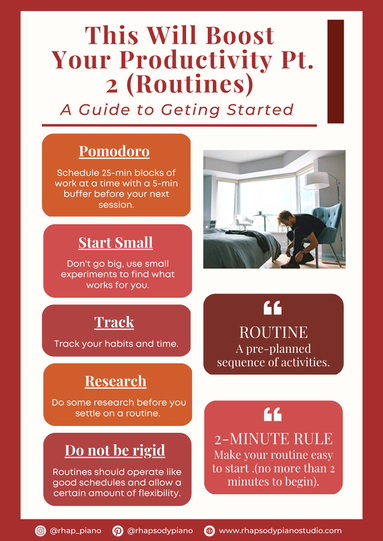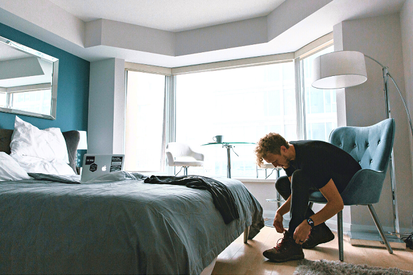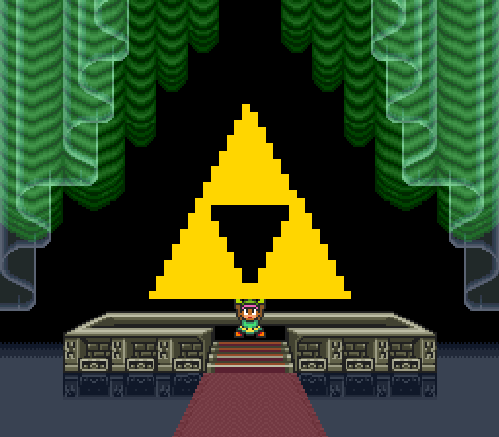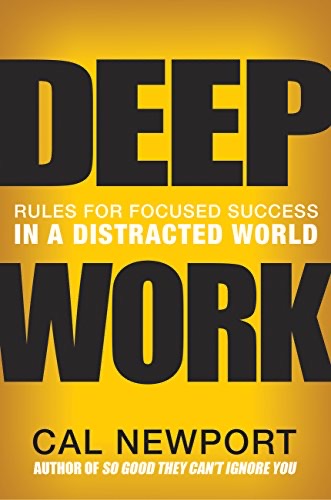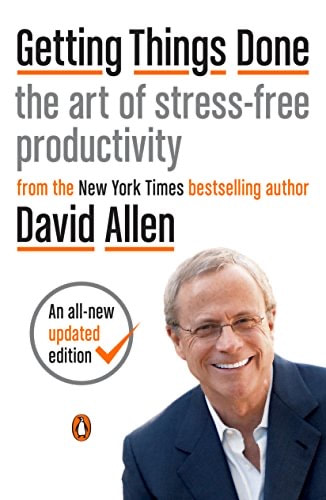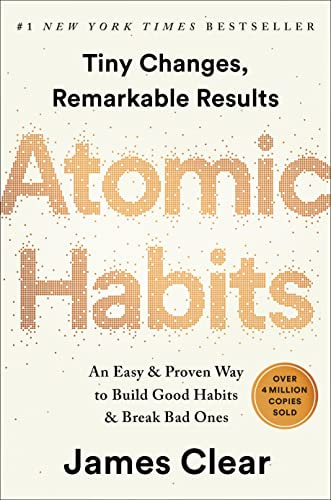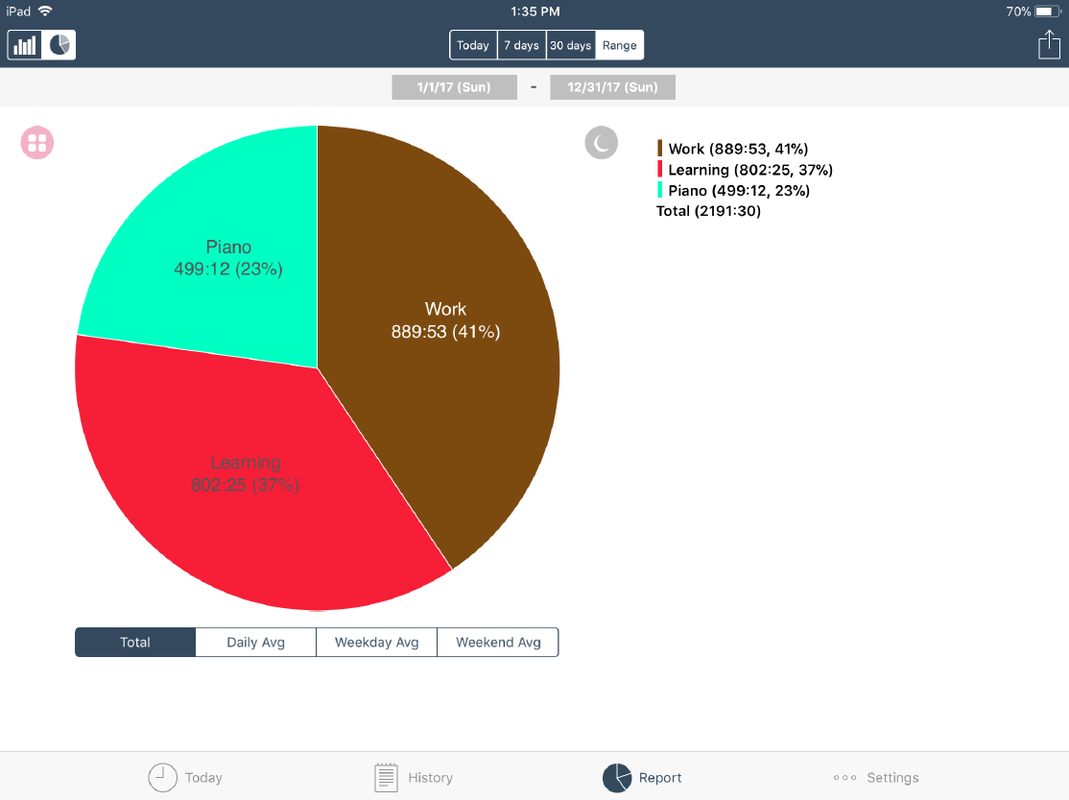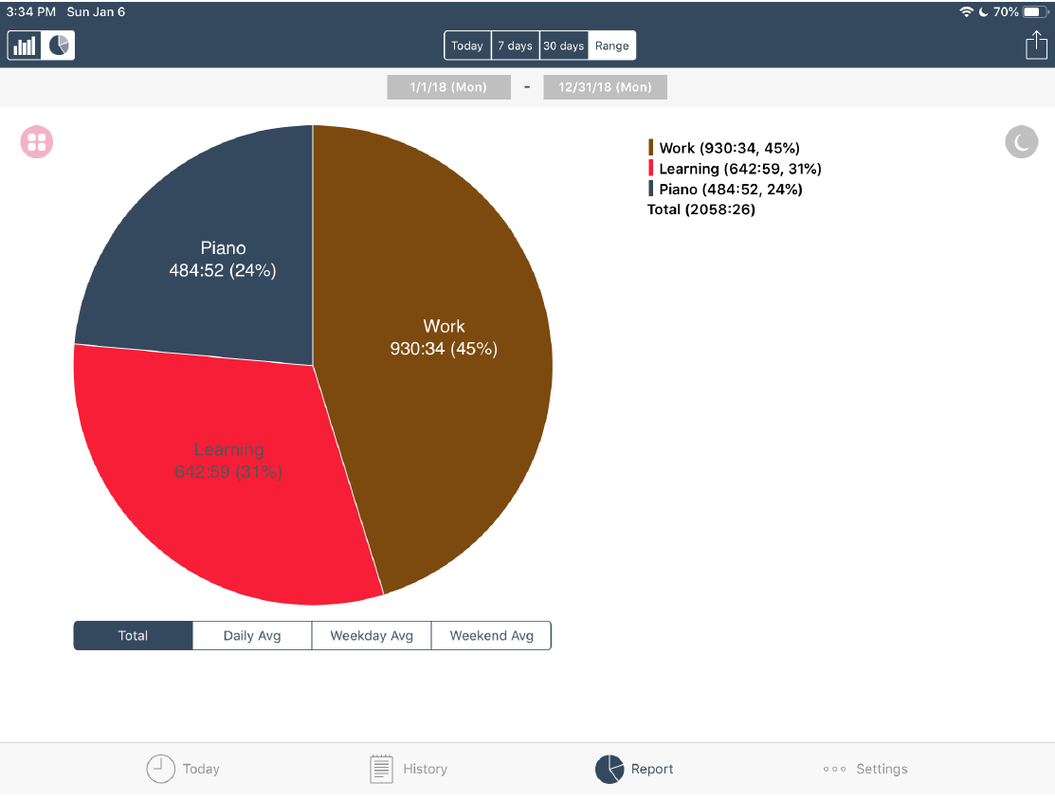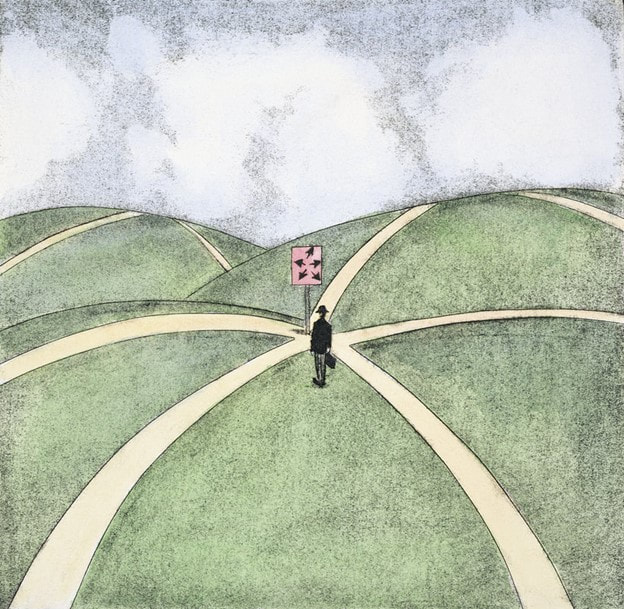|
Help support the blog so you can continue receiving content and free guides.
This article contains affiliate links … If you choose to purchase, this means I receive a (very) small commission at NO EXTRA COST to you! In last week's article, I discussed the importance of having aritual for productivity. Rituals are the spark, while routines are the logs that keep things burnin'. One of my idols, Alex Hormozi, actually argues that rituals and routines are a total waste of time. But I don't believe that's true. In fact, I think that type of thinking is dangerous. It's because rituals are like superstitions. It's not really why you believe in them or not, it's the function they serve. For example, walking under a ladder is a traditional form of "bad luck." When people ridicule this, they're missing the point. It's not really about bad luck - it keeps you from getting hurt. Here's another one: an apple a day keeps the doctor away. No, the apple isn't the cure all to all your health conditions. The point of this saying is to get more healthy food into your diet. Rituals are just as necessary as superstitions and routines are just as necessary as rituals. For instance, what do you do at the beginning of exercise? You warm up your body so you won't get hurt. You also warm up for your piano sessions to get good results from what you practice. Useless? I think not. The Point of a Daily RoutineNow before we get into the benefits of a routine, how should we define it? For me, simple is best: a pre-planned sequence of activities. By defining it this way, even your entire work day can be a routine. Just as I mentioned in last week's blog post, keeping our definition broad creates more versatility. This means routines are adaptable - you can create them for anything. These activities can range from work-related tasks, personal projects, or even getting to bed on time. FYI, the bulk of my own activities are learning projects and habits. Even better, you can think of learning as an actual habit. Doing this allows you to take principles and concepts from books like Deep Work and Ultralearning (more on this later). Daily Routine: Deep DiveLet's go deeper on why we need routines. In a sense, routines are like schedules. Schedules help us maintain a sense of order - imagine going to work without knowing how many hours you'd be staying. And we gravitate to things like this because we're pattern-recognition machines. We have a difficult time dealing with randomness. For instance, my dad often spoke to me about how good his friend's daughter was ... at slot machines. That's like saying you're a really good coin-flipper. We have an incessant need to have an explanation for everything and anything out of place has to be put in some type of order. But routines aren't so much about making every single day as perfect as as possible as they are a way to bring structure to our lives when things get chaotic. And they also help you think in small chunks. Huge, massive projects feel overwhelming, mostly because we envision the entire thing from start to completion. If I had to write this article from start to finish, my thoughts would soon become suicidal. The optimal approach is to break it down into manageable segments. And once you know what these segments are, then you can lock them into a chain of sequences (routines). Next, some benefits. The ProsBy having everything planned ahead of time, you get rid of decision fatigue. I believe the bulk of people's time is wasted on making decisions. One form of decision hell is something we all know too well. For example, my wife and I go through the same song and dance every weekend - what do you feel like eating hon? Sometimes having too many choices (see: Yelp) is worse than not having enough! But I digress. It's much better to accelerate decision-making or abolish it altogether, so you can conserve all that mental energy for the important work that matters. As I've said before, expectancy creates productivity. When you know what to expect, it's easier for your mind to lock in with the right type of focus. It creates a "mind like water" as David Allen says. Another thing I'll never get sick of repeating is that productivity - like creativity - is a process of elimination. Many times people are looking for things to add: this app, that tool, etc. But too many choices causes confusion (see: Yelp). Instead, think about what you need to remove. This is why your work environment matters so much. The less clutter you have (both physical and digital) at your desk, the simpler it is to get started. It's easy to work when there are no distractions. So if your work environment is about eliminating visual distractions, routines serve to eradicate mental ones. It's like programming your brain: you just need to execute one command after the other. CautionIf you have no idea where to start, and need a template to follow, I'll share mine in a minute. But before that, a few general guidelines. Don't be rigid, unless you want a nervous breakdown. Routines should operate like good schedules and allow a certain amount of flexibility. Just think of yours as a compass to point you in the right direction. There will be moments where you lose track of time or get behind on your workload. When that happens, just revise, reprioritize and get back on track. If you're able to accomplish 70-80% of what you set out to do, I'd say that's a great day. One last word of advice: spend time on preparation before you settle on a routine. This could mean gathering all the right tools (see next section) or envisioning your day unfolding realistically. A good suggestion is from Scott Young's Ultralearning. He recommends you spend at least 10% of your total projected time on research. For example, if I'm going to spend 40 hours learning a new language then at least 4 hours of that will be spent on groundwork. Even if you aren't planning a massive undertaking like becoming fluent in Spanish, as little as 10 minutes of upfront exploration can you save hours of wasted time. BlueprintHere's how I go about my routine. I schedule everything in 25-minute blocks. This is what's known as the pomodoro (Italian for tomato) technique, so-called because the inventor, Francesco Cirillo (also Italian) used a tomato-shaped timer for work. Why 25 minutes instead of 30? This is to include a 5-minute "buffer" which acts as a safety-net. There will be days where you execute everything perfectly, but most of the time things will be dropped on your plate at a moment's notice. For example, you might suddenly need to call someone back, shoot off an email or, file this under TMI, battle the toilet because of those nachos you ate last night - bad decision (but somehow still worth it). If you don't have these buffers in place, any small disruption can unnerve you and throw off the entire day. That's also why it's a good idea to start small. Be ambitious, but temper that with reality. Use small experiments to find out what works, lest a disaster implodes in your face. The other reason, at least at the start, is that you want to accomplish everything you set out to do. This is why checklists are so satisfying - when you finish every last bite on your plate, you can't wait until your next meal. To accomplish this, focus only on one thing at a time. For example:
And so on. For piano sessions, this could be:
You might devote the first 30 minute session to technical practice (scales, arpeggios), another for musicianship (ear training, harmony, solfege) and finish up with repertoire (songs or pieces). Or you could schedule 1 or more hours on one area. For example, musicianship could be divided into 3 blocks of ear training, harmony and solfege. For repertoire, you could work on a Beethoven, Chopin and Debussy piece. Technique could be split into arpeggios, scales and etudes. You get the picture. However, I don't recommend this last option until you've developed enough concentration to handle the workload - it takes a lot of focus to pull off these longer sessions. ToolsNow, I happen to have a ton of digital tools at my disposal. However, I love using a physical habit tracker for the following reasons:
And when you see those x's tic-tac-toeing across page after page, it's easy to stay motivated and disciplined enough to keep the chain going. But you don't have to limit this to habits or things you're learning. You could just as easily include responding to emails and more technical tasks - or even remembering to take your supplements every morning. In addition to a habit tracker, you might want to track your time - the app I use is Atracker. I've previously covered why it's useful to measure what matters as this helps you keep records of what you spent time on. For example, I have data on every minute I spend on work and learning. Once you have a record of your time, you can see if you've been using it well (your target areas) or if you're falling behind. You either keep doing what you're doing or allocate your minutes to the things that matter. Tick, Tock
Lastly, it can be useful to have several routines scheduled throughout the day. For example, my work routine might be different than the work I do in the evening. Or it can be a continuation of the same routine - to squeeze in more valuable hours before bedtime. A third option is to use a routine to recharge. This is the purpose of my stretching and meditation session before teaching. I'm usually exhausted after my morning-afternoon pomodoros, so doing this gives me a second wind. If you're interested in more, see my blog post where I utilize this concept with ideas from Deep Work. With this plan and these tools, you have a powerful formula for productivity and discipline. ConceptsNow, I'm going to share a few concepts and strategies that will not only boost the quality of your work sessions, but act as safeguards. The 2-minute rule from Atomic Habits will help you maintain discipline no matter what life throws at you. The idea is that you should make your routine as easy as possible to start - meaning it should take no more than 2 minutes to get going. What this does is reduce friction, which ties in directly with what we discussed earlier performance by subtraction. Productivity = elimination (of obstacles). However, I've found it most useful for bad days - when you've mismanaged your time (played too much with the corgi) or when something gets tossed at you unexpectedly). Instead of skipping any parts of my routine, I elect to shorten the time I spend on them:
Side note: I do take weekends off, however - it's like a longer buffer. If I had to actually skip a part of my routine during the weekdays, guess what? I can "make it up" on the weekend - and minimize the risk of burnout. A bad day in the gym is still a day in the gym. Over time, this becomes your identity: You become a person who never skips a day. And whatever identity you have, you'll do everything possible to live up to it. It's much better than having to constantly motivate yourself. Lastly, you can pair certain habits or actions together. For example, during my stretching routine I'll also study my language app on my iPhone at the same time. You've probably done some version of this already - such as doing laundry, washing dishes, or commuting to work while listening to a podcast. Get creative and see what else you can come up with. And if you figure out something cool, let me know! What're You Waiting For?One simple routine can mean the difference between failure or victory, between a productive day, year, or even life. But this only works when you see how each single action you take is connected to the trajectory of your most important goals. One action, one habit becomes a small, but crucial, part of your work day. And the entire routine becomes critical for your success. "We are what we repeatedly do," said Aristotle. You are your actions. In the same vein, your routine is you. So take what you've learned today, put it into action, and prove to yourself the type of person you want to be. I have faith in you. Happy practicing!
Did you enjoy reading this today?
Your donation helps me create free content. Every dollar goes a long way! =)
0 Comments
This article contains affiliate links … If you choose to purchase, this means I receive a (very) small commission at NO EXTRA COST to you!
From the book Daily Rituals, by Mason Currey, we learn about the daily routine of - arguably - the most important composer who ever existed:
Beethoven rose at dawn and wasted little time getting down to work. His breakfast was coffee, which he prepared himself with great care—he determined that there should be sixty beans per cup, and he often counted them out one by one for a precise dose. Then he sat at his desk and worked until 2:00 or 3:00, taking the occasional break to walk outdoors, which aided his creativity. Actually having the patience to count sixty three beans seems unusual, but it didn't compare to his bathing habits: If he did not dress to go out during the morning working hours, he would stand in great déshabillé at his washstand and pour large pitchers of water over his hands, bellowing up and down the scale or sometimes humming loudly to himself. Then he would stride around his room with rolling or staring eyes, jot something down, then resume his pouring of water and loud singing.
You might be reminded of the quote, "genius is one step away from insanity." Like, is it really necessary to go to such lengths just to get some work done? YES. Yet Alex Hormozi, a successful businessman and entrepreneur whose advice I've followed faithfully, says the opposite. He states that rituals are a waste of time. His argument is that they're a form of procrastination, and that you should just eliminate them and get to work. And as much as I look up to him, I completely disagree. I mean, if that were true then Lebron James would never chalk up his hands before every game. Religious people would stop praying. Every superstition in the world would disappear. You see, rituals serve a function. Now, in Hormozi's field of work this function might have no purpose. But for me, a daily ritual has been fundamental for my productivity. And if you're not convinced, pick up a copy of Currey's book. It's hard to argue with 278 pages of proof. So in part 1 of this 2-part series, we'll cover:
In part 2, we'll continue this line of thinking with routines. PurposeFirst of all, what exactly is a ritual? Though your definition might be different, here's mine: a single action, or set of actions (physical or mental) you repeat on a regular basis to prepare your mind for a certain activity. This idea is closely related to an anchor. One example is Pavlov's Dog:
The bell was an anchor for the dog while a ritual is an anchor for your mind. You'll also notice that the definition is broad. And since it's so broad almost anything can be a ritual. For example, something as simple as clipping your fingernails can be a ritual. Like a warrior sharpening their blade for battle (okay, that might be a stretch). It's not so much the act itself, but the intention behind it. Now, let's take a look at the benefits, or functions, of rituals - all of which have an impact on your productivity. Junction, Junction, What's Your Function?The first benefit is control. Your ritual can be something you can do at any time of the day and any place. What makes control so important? Because it's related to your happiness. Lack of control is what makes people miserable. Everyone has stories about jobs they've hated or teachers who made their life a living hell. And besides that, life can be unpredictable. On chaotic, stressful days, a ritual becomes your ally. A good ritual also gets your mind into a certain headspace. Nowhere is this more apparent than in sports. One of my favorite pre-game football huddles was Drew Brees doing his best imitation of Leonidas from the movie 300 - THIS ... IS ... NEW ORLEANS!!!. Every team has a pre-game ritual, every battle chief has a warcry. Now, if your ritual is more elaborate you can create momentum. You're able to "stack" them one after the other, with each part leading directly to the next one. This is the science behind checklists: every item you check off leaves you feeling satisfied, invigorated. But in this case, it's like a checklist for motivation - very useful for days when you can barely get out of bed. You also achieve a process-oriented mindset. This is because the whole point isn't about achieving a certain result or outcome. Rituals are a form of active meditation. There's no endgame or result - it's about practicing awareness. The more present you are during your ritual(s) the more you'll benefit from the calmness you feel. And a calm mind is a productive (stress-free) mind. Lastly, daily rituals are a form of discipline. Over a long period of time, it actually feels weirder when you skip. And for me at least, I've been able to use my rituals as a starting point to maintain discipline in other areas of my life. How to Be Productive: The BlueprintSo here's what I do. I have 2 rituals - one for the morning and one before I begin teaching. I use my morning ritual to signal the beginning of my morning work session and a second afternoon ritual to wind down and prepare for piano lessons. The first thing I do look at my memento mori coin. Memento mori is a Latin saying that translates to "remember you have to die." It's a reminder of mortality and to not waste my time on trivial matters. Next, I journal. What I write about might be different every day. Sometimes I'm just "emptying the tank" so to speak - if I have a lot going on in my life, I just lay it all out. Other times I might be more purposeful, such as planning the day ahead or writing about things that are going well ... or aren't going so well. Afterwards, I get to work. After about an hour or so, and when I feel my concentration waning, I head back to the kitchen for the best ritual of the day ... COFFEE. And I prefer the physical act of hand-pouring 2 cups of coffee (for me and my wife). The physical act is enjoyable and it helps me slow down. It's like I mentioned earlier - active meditation. Then ... more work. After a few more hours, I wrap up my work session and then it's time for my next ritual I head back upstairs to stretch and wind down. While I'm stretching, I use my inside voice to repeat my 3 daily mantras:
I finish up with a meditation session and off I go to teach. Now for some practical advice.. Help, I Need a RitualFirst, do NOT use my rituals as a model. It's something that took me a decade of trial and- error to develop. When I first began, I started small - while trying out many different things - and I suggest you do the same. Secondly, whatever you choose make sure that they will be things you look forward to doing. And third, make sure they're process-oriented, meaning there's no specific outcome you're hoping to achieve. Just take enjoy the action itself. Also, make your ritual something you do first in the morning. By doing this, you prioritize its importance and also start your day off the right way. And don't be rigid, you don't want it to feel like the end of the world if you're not able to complete everything on your list every single time. In fact, plan for bad days to happen. There's been many a time I've had to shorten my ritual or even skip some parts altogether. Tell yourself it's okay if this happens - a bad day in the gym is still a day in the gym. You not only keep the "chain" going but you prove to yourself that you're the type of person who follows their daily ritual without fail. Now, there may come a point when you stop enjoying your rituals. This usually means 1 of 2 things:
If you're bored, then change things up. You can try new rituals or change the order of the one you have. If you're not present, you probably need to release some stress or practice awareness (meditation). Sometimes it's as simple as stopping for a few minutes and taking really slow, deep breaths. Lastly, you might want to incorporate a nighttime ritual. Cal Newport calls this a shutdown ritual. The benefit is it signals your brain to begin getting ready for bed. An example is stopping all work-related tasks at a specific time and unwinding with some light reading or entertainment. As someone with sleep issues, this has been an IMPORTANT step. The First Cut Is The DeepestTwyla Therp, in her book The Creative Habit, says: The ritual is not the stretching and weight training I put my body through each morning at the gym; the ritual is the cab. The moment I tell the driver where to go I have completed the ritual. James Clear (Atomic Habits) calls this a decisive point. He defines it as the crucial moment before you make a decision or take a specific action. One small action can compound over time, resulting in huge payoffs. And the opposite is true as well - one small, bad decision can create a thousand headaches. Your ritual becomes the entry point to a productive day. With practice, you begin to understand that everything is connected. One simple action starts an entire web of processes. And that process can lead to a great month, year, or even decade. So the next time you finish an important project or achieve a substantial goal, remember that the starting point was your ritual. Lastly, you won't have great results all the time. You can't always control how your day will go, but you can at least start it the right way with a good ritual. Hope to see you back here for next time when we discuss routines. Happy practicing!
Did you enjoy reading this today?
Your donation helps me create free content. Every dollar goes a long way! =)
This article contains affiliate links … If you choose to purchase, this means I receive a (very) small commission at NO EXTRA COST to you!
What does it mean to be productive?
If you asked me this question during my teenage years, I'd answer like a factory worker - you pull levers, push buttons, flip patties, etc. For example, my family's first business was a dry cleaners and our second was a liquor store. These were stores anyone could run. It didn't matter who was at the helm or who we hired. No degree or skillset required. But today, productivity is something very different. It's not just punching in and punching out after a certain amount of hours. It's about creating valuable products and ideas, something unique that no one else can do. That is ... if you want to be successful and not just another commodity. Though, in order to accomplish this you have to protect your time - because the modern world is a giant distraction machine that will pull you away from your most important work every chance it can. The cards are stacked against you. So in this article, I want to share the productivity framework that has worked for me: Strategy + System + Automation You choose the right work strategy to enhance your focus, set up a system so you have everything you need wherever and whenever you need it, and use automation to keep things humming. For the rest of this post, I'll briefly discuss the 3 books I developed this framework from. So whether you're struggling to find more practice time - or trying to get more mileage out of your sessions - if you like what you read today, I hope you get these books and examine them on a deeper level. The Best Books on Productivity in 2023Strategy
What is "Deep Work?"
Cal Newport (author) defines it as:
If productivity is a car, Deep Work is your fuel. To succeed today, it's not enough to put out quality work. You need both quality and quantity. As Newport says, you need to produce at an elite level. But there are 2 obstacles in front of you:
Most schools and businesses love to drown people in shallow work, which Newport describes as, "non-cognitively demanding, logistical-style tasks, often performed while distracted." The problem with shallow work is that it can be done by anybody and won't contribute much new value . So if your job consists mostly of shallow work, find a new one as fast as you can - because you're easily replaceable. In addition, we're bombarded with distractions: either from people emailing you nonstop or getting sucked down the internet rabbit-hole. What you read in Deep Work will give you a clear set of instructions for distraction-free focus on your most important work. Useful IdeasThe first thing I learned is to choose the right deep work strategy. Newport calls these "philosophies." Here they are in no particular order:
But don't think you have to stick with one forever - if your schedule changes, you can just switch your approach. And it's even more powerful when you learn to combine them together. Read this blog post if you're interested in how I utilize the journalistic and rhythmic philosophy together. Secondly, I learned about recommendations on how to enhance or maintain the quality of your concentration - much of which is centered around controlling your attention (staying off the internet). Here are a few:
With the principles from this book, I've completely transformed the way I work. I hope you try out these ideas. I you're a nerd like me, you'll realize there's nothing more satisfying than a day spent in depth. System
If you've ever felt like you're drowning in tasks and have a thousand emails in your inbox, Getting Things Done by David Allen, is the book for you.
This is your productivity engine. So why do you need a system in the first place? It's because even if you have the right strategy in place, it'll fall apart if you're an unorganized mess (I've been there). You'll waste precious time and mental focus just trying to remember what it is you needed to do - or where you placed your car keys. By having a system in place, where everything is optimally set up and organized, all you need to do is sit down and work (as easy as starting your car). At a surface level, Allen teaches you to organize all your thoughts and tasks with an efficient, but complex, filing method. For example, there are plenty of suggestions on different categories or "buckets" you can sort your documents or tasks into. There aren't any hard and fast rules to creating categories, however ... they're context dependent. For example, one of my buckets is "laptop,"" which means any work that can be done on a computer (usually at home). But for someone who commutes, their bucket might be "office" - any work done at their job-site. It's such a simple idea, but most people who struggle with productivity glance over this important step. Sorting a task, almost any task, requires thoughtfulness. When you spend some time upfront doing this - which will be less and less as you improve your thinking - you're creating less friction for your future self. When you have everything in its right place, when and where you need it - when you have a 100% dependable system - you create a "mind like water" as the author puts it 100% stress-free productivity. Useful IdeasOne of the most powerful ideas in this book is how to define your next action. Let's use steaming the carpet as an example. You might be inclined to label it as "steam the carpet." The problem with that is there are more steps involved than at first glance. For instance, you first need to fill up your carpet steamer. Before that, you need to take it out of the closet. And if your machine is on the second floor, you need to walk up the stairs. So instead of labeling it as "steam the carpet" it becomes "walk upstairs." Defining the next action shows you how a single, simple step is just one link in a complex chain. And you not only become a better decision-maker but are able to trust your system completely. You won't feel resistance towards a task or forget to do it. Ever again. Automation
Atomic Habits by James Clear, is THE playbook for developing permanent, consistent habits as much as it is about eliminating the worst ones.
The previous two books are definitely important, but this is the one you can't miss out on. Why? Because good habits are hard to make, bad habits are hard to break. That seems like the understatement of the year, but beneath the surface it's complicated. Let's see why. Clear says, "Habits are modern-day solutions to ancient desires." This means we're conditioned to take the easy way out - which explains why it's easier for me to sit down with a bowl of salted caramel ice cream than type on my MacBook Pro. So if you don't have good habits in place, you'll just default to your ancient desires - which aren't usually in your best long-term interests. As James Clear says, "You do not rise to the level of your goals. You fall to the level of your systems." Since we're living in a time that makes it ridiculously easy to make bad decisions, this means you're more likely to stuff a double cheeseburger in your mouth than munch on a kale salad. But seriously, you gotta do everything you can because every company out there is aware of this fact - with an army of employees doing everything they can to take advantage of you. Useful IdeasThis entire book is indispensable, in a nutshell you'll learn the following: How to Create a Good Habit
How to Break a Bad Habit (Inversion of the 4 laws)
Every chapter is chockfull of tactics that will get you immediate results or long-term processes that will make them permanent. This is a book I continue to review year-in, year-out. If you want to avoid setbacks forever, this is the final piece to keep your productivity vehicle firing on all cylinders. Conclusion“Civilization advances by extending the number of operations we can perform without thinking about them.” - Alfred North Whitehead. So the less you need to think - about trivial details - the better decisions you make. As David Allen says, you close the loop. If you're a sports buff, you know exactly what I'm talking about. The team that thinks too much is the team that loses. The ones that aren't thinking are having way more fun - and winning. And remember that the world is like Newton's first law of motion: an object in motion stays in motion. You must always be evolving, innovating, changing. Productivity will likely look different in the - perhaps, very near - future. A great professional and personal life is possible for anyone. But for that to happen we need every tool available - I hope you use my framework to not only thrive but protect yourself from all of today's distractions and temptations. Happy (productive) practicing!
Did you enjoy reading this today?
Your donation helps me create free content. Every dollar goes a long way! =)
With 2023 just around the corner, let's talk about the yearly tradition that happens after you've drank your champagne (or cider) and sung Auld Lang Syne - resolutions.
Every January you see people posting on social media how they're going to shave off their love handles or read x number of books by year's end. And every year, those promises are broken. Why? Because the traditional thought process behind New Year's resolutions is wrong. Resolutions are year-long commitments, which is crazy! I mean, I don't always know what I'll be doing - or where I'll be - the next month. It's like Bitcoin - you have no idea what's going to happen. So what can we do instead? How to be SuccessfulSmall-Chunk SuccessWell, here's how I approach my "resolutions." First of all, I don't even like the idea of resolutions - it's like locking yourself into an unwanted contract or going on a 6-hour road trip with no pit-stops (yikes). The other reason I don't like resolutions is that there's usually no plan involved, and a goal without a plan is just a dream. So instead, I think "what projects do I want to accomplish?" By working on multiple projects, you create lasting momentum and satisfaction. You're going to have to experiment, but what works extremely well for me is dividing the year into 3-month periods - what businesses call "quarters." Within these quarters I work on several projects simultaneously or bigger ones broken down into smaller components. It's also the perfect timeframe. At the end of each 3-month period, I'm ready for reflection. If things are going good, I'll keep most of my plans in place for the next quarter. However, sometimes I'll change course entirely. It's about giving yourself options. To enjoy your work as much as possible, one way is to feel in control. To feel in control, give yourself plenty of choices. So if I'm not feeling good about the work I'm doing, I have no problem with changing my mind on a whim. Measure SuccessAdditionally, you'll want to track your time because it will give you vital information. I do this every:
When you review on a weekly basis, it keeps you focused. For example, I'll look back at a certain week and notice I've fallen behind on my time spent on certain activities. Maybe I had too many cocktails or screen-time (pick your poison). Maybe I had obligations, like going to the doctor's office or taking my pups to see their vet. Either way, the weekly reflection keeps me on track. Monthly and yearly reviews are just as important because it's like having different "vantage" points. For instance, feel the difference in perspective:
You see the big picture (monthly, yearly) as well as the details (weekly). Now, over a longer period of time you'll notice patterns. Since I have records dating back to 2015, I can see how my work habits have changed.
From 2017-2018, you can see I increased "work" hours (focus on $$$) while decreasing time spent on learning ?
Not only that, it helps me plan for the next year. For example, I notice I spend a lot more time on tasks, other than teaching, in December. When I look at my calendar, I can see it's because a lot of students are taking time off before the new year.
Because of this, I know exactly what I want to do when winter arrives. Expectation creates productivity. Vaya Con DiosWe look to the past in order to have a successful future. This is the reason why we study history - not only to learn new lessons, but to see how errors repeat themselves (ever read about the Spanish Flu?). By planning your future, you'll avoid making the same mistakes. This is something the most successful people do - you'll overhear them talking about their next decade (instead of their next vacation). If you did this, imagine the story you could write for yourself. When all is said and done, what do you want your history to say? I wish nothing but the best for you in 2023 and hope this post gets you started the right way. Happy practicing and Happy New Year!
Did you enjoy reading this today?
Your donation helps me create free content. Every dollar goes a long way! =)
In our personal and professional lives it’s certain that if you want to get somewhere, you need a goal.
Not having a measurable outcome can set you up for failure; you need a target to hit, a bull’s-eye. But the downside to this approach is that in order to have long-term success, you need to operate outside of your comfort zone. A lot. And that means dealing with that constant, nagging feeling of uncertainty.
I believe that if you are committed enough, you will accomplish your goals.
But how you get there and what you will do isn’t always clear. The results may completely surprise you and your goals might actually change. For example, take my blog posts. This may not surprise you, but I usually don’t know what I’m going to write about next. This doesn’t mean I don’t write down ideas. Sometimes I have future topics lined up, sometimes I’ll go for days where I have no idea what to write about and sometimes I’m ping-ponging back and forth between certain topics. Yet I make sure to sit down at the computer every day. No matter what. Sometimes writing like a madman, sometimes staring at a blank screen like a zombie. Although it doesn’t feel good, more often than not everything comes about organically. Most successful people have the following trait in common: an unwavering faith in their abilities that is borderline delusional. They’re overwhelmingly positive and confident. But they’re also realists; they know it’s not all rainbows and roses. They’re resilient. It’s easy to be in a productive state of mind. What’s hard is when it’s not working for you and you don’t know why. Don’t stop. It’s a shame to see people give up so soon. They don’t realize that sometimes they’re just a tiny step or two away from achieving their goals. Did you ever hear the parable about the gold miners? To make a long story short, there were these miners who dug for months without a single shiny object to show for their efforts. As soon as they give up, along come other miners who immediately strike gold in the same area. All they had to do was dig another inch. One inch! Then again, sometimes you think it’s right around the corner, but surprise! There are a few more miles to go… So stay the course but don’t be a fool about it. Take equal time for self-evaluation. Try to find out if you’re an inch away or on a treadmill to nowhere. Here’s one way to deal with uncertainty: just expect that unforeseeable events will happen. The only thing you can be certain about is that the bad will always follow the good. You just don’t know what kind of bad to expect. There will be slumps. There will be difficulties. There will be personal, family, financial and emotional problems. Pure chaos. Or maybe just minor annoyances. Little flies to be swatted down. In any case, just know that “winter is coming.” A full-blown blizzard or light snow. Do yourself a favor and get used to it! If I’ve been in a “flow” state where everything is clicking for me in piano, writing and teaching, I just know I will fall out of rhythm soon. I don’t look forward to it, yet I’m also anxious at the same time. As cheesy as it sounds, there’s always sunshine after the rain. I know I’ll grow (somewhat) or learn (something). Many of my strongest epiphanies and realizations happened after feeling lost and confused for months at a time. The Path to Success = Uncertainty?
Spring comes after winter.
So get 100% comfortable with uncertainty, stop trying to predict the future. It’s going to happen for you and you won’t know exactly how you’ll get there or how you’ll do it. Prepare to expect the unexpected. Don’t let things get you down. Long-term progress is bumpy, riddled with detours, obstacles and flat tires along the way. Be prepared for the long run or you won’t make it. As counterintuitive as it sounds, get some more uncertainty in your life. When most people zig, make sure you zag. Happy practicing.
Did you enjoy reading this today?
More from Rhapsody Piano Studio…..
Your donation helps me create free content. Every dollar goes a long way! =)
|
Categories
All
|
